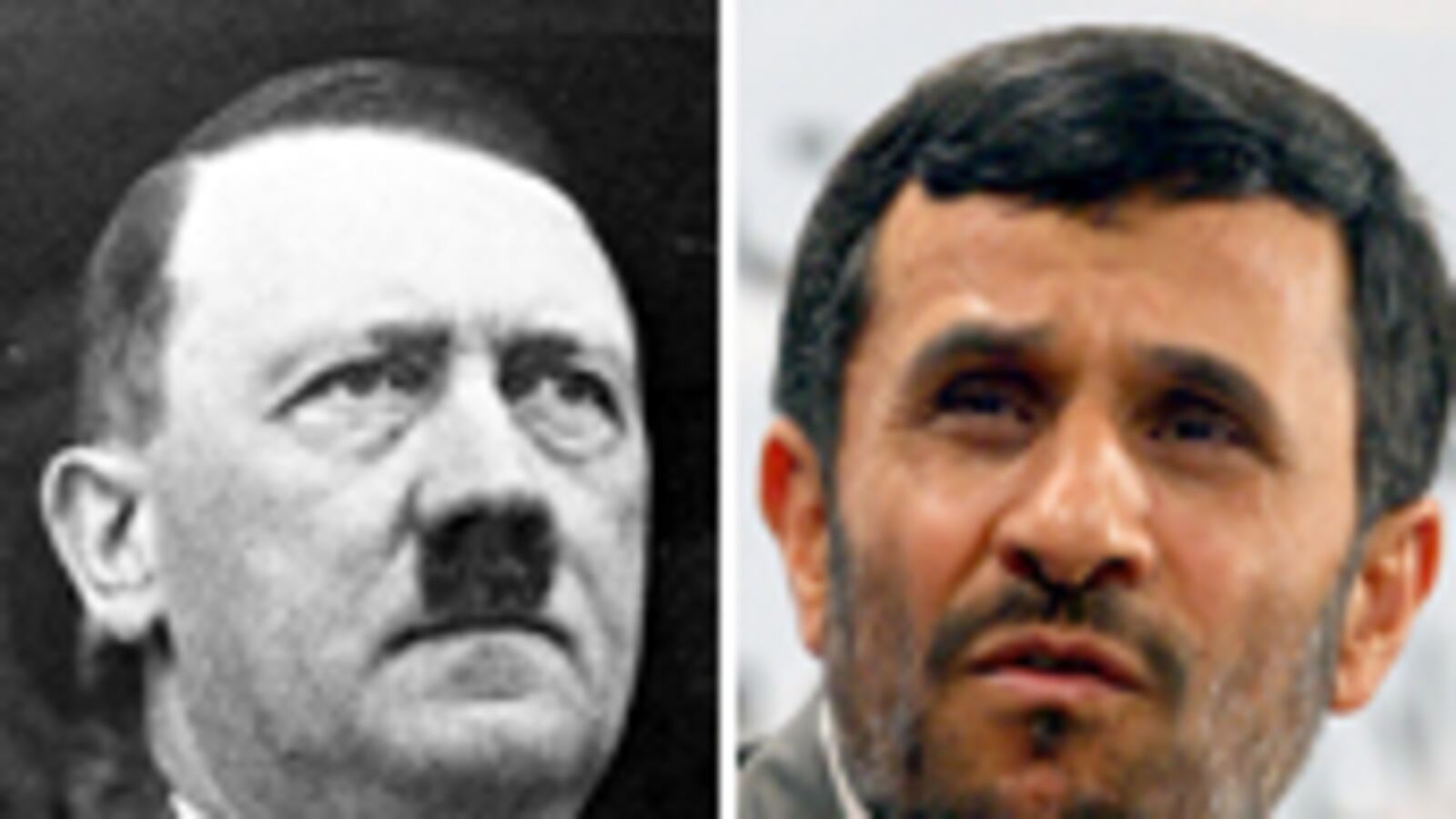
The Iranian incumbent’s not the next Adolf, and Iran is no Nazi Germany. Former Council on Foreign Relations consultant Nazee Moinian on why Ahmadinejad won’t attack Israel, why he doesn’t want a nuclear bomb—and why, ultimately, he’s more nuanced than the West believes.
Should Mahmoud Ahmadinejad stay put as Iran’s president for the next four years following his surprise “victory” over the popular Mir Hossein Mousavi, the Obama administration and the American people may find themselves with the daunting task of understanding a man they care to know little about.
For starters, they shouldn’t believe every word Ahmadinejad says. In Iran, there is more value in what one doesn’t say, or doesn’t directly say. So while the Iranian president has become a poster boy for belligerence, here are some nuances that may help the shell-shocked or even the mildly amused navigate their way through his tough talk:
Comparing Ahmadinejad to Hitler insults the memory of the Holocaust more than his ignorant denials of it.
Ahmadinejad is no Hitler. The comparisons abound: Two men, hateful of other powers, defiant of international laws, delusional in their aspirations, and deceitful in their ways. Both hate Jews, and while one sends 6 million to their deaths, the other blames all the malaise in the world, directly or indirectly, on their “arrogant power” and “sickening influence.” Both appeal to the masses under the cloak of nationalism, and Ahmadinejad is even sanctified by a certain 12th imam who “protects” him and bathes him in a “heavenly halo.” Both reach far beyond their borders: Hitler’s Wehrmacht marches into distant lands and ransacks everything in sight, while Ahmadinejad and the Revolutionary Guard Corps export the Iranian revolution by supporting proxy wars in distant lands. So why isn’t Ahmadinejad the next Hitler?
As an Iranian Jew, I am often chastised for trying to explain the bizarre behavior of this paranoid regime. But the fact is that Ahmadinejad is not the same as Hitler, because Iran is not pre-World War II Nazi Germany. Iran has a growing population of 25,000 Jews, the largest in the Middle East outside of Israel, with a dozen functioning synagogues that serve as places of worship, social centers, and religious schools. Children are taught Hebrew at an early age, and celebrating the High Holidays is encouraged by the Islamic regime. There is a Jewish representative in the Iranian parliament. There is no orderly, systematic killing of Jews anywhere in Iran.
Comparing Ahmadinejad to Hitler insults the memory of the Holocaust more than his ignorant denials of it. So what of Ahmadinejad’s vitriolic rants against Israel?
Iran will not attack Israel. “Israel will be wiped off the map,” we’ve heard him say dozens of times, and each time we’ve been shaken to our core. As he utters these hated words, we imagine another Holocaust. Not the pogroms of yesteryear but a nuclear firestorm in tiny Israel, unleashed by laughing, sword-wielding mullahs. And we are reminded of another tragedy on our own shores: If bin Laden did it to us, why wouldn’t Ahmadinejad do it to Israel?
Again, the answer lies in what he hasn’t said: “We will wipe Israel off the map.” In Farsi, the future perfect form of a verb, when used in certain contexts, denotes a passive action or desire. The use of “will be wiped off the map” conveniently leaves the action to an unspecified entity. Ahmadinejad, a master of wordplay and double entendre, relishes the fact that we take him seriously and dissect his every word. In several Farsi-language broadcasts, he has explained with a smirk that what he really meant was that “upon a referendum of all the people in Palestine, Israel will be voted out of existence, by the way of the ex-Soviet Union.”
The Iranian regime knows that launching a nuclear attack on Israel will turn Iran into a scorched dustbin. This regime is not an apocalyptic cult with a death wish. So why is Iran enriching uranium?
Iran does not want the bomb, for now. Sandwiched between nuclear India, Pakistan, and Israel, and neighboring hostile Arab countries, Iran has legitimate security concerns. While it has had normal and even amicable relations with India and Pakistan, with which it is developing a “peace” pipeline to transport oil and gas from its southern fields, it is extremely paranoid. The animosity between Iran and its Arab neighbors runs wide and deep. And this week U.N. nuclear chief Mohamed El Baradei expressed concern that Iran may be secretly working on a nuclear bomb.
Should Iran acquire nuclear capability, it will behave like other nuclear nations: protective, cautious, and more secure. Barring crippling sanctions and an Israeli military strike, it will probably adopt a Japan model, where reprocessing and enrichment are kept just below a threshold, with the capacity to “break out” quickly if needed. This model serves two purposes: It furthers the Iranians’ reverence for superior education and technological advancement, and it satisfies the mullahs’ fear of a regime change à la Saddam.
Both objectives are “peaceful,” as Ahmadinejad and Iranian diplomats have insisted. They are “peaceful” because they are not warlike now—again, another ambiguity perpetrated by the regime. So if Iran is really a peaceful country, why all the tough talk?
Ahmadinejad is not speaking on behalf of Iranians. He is not even speaking to the Iranians. His Holocaust-denying, Israel-bashing tantrums are not for local consumption. They are for young Arabs on the streets of Egypt, Syria, Saudi Arabia, Lebanon, and beyond. In fact, the average Iranian does not care about the plight of the Palestinians. As long as there are shortages of bread, gasoline, electricity, housing, and jobs in Iran, the Palestinians can wait their turn for Persian sympathy. Palestine has become a cause célèbre for the current Iranian regime because both the supreme leader and Ahmadinejad understand that this is the only way they can wield influence in the Arab world. Their crafty use of soft power, however ill-intentioned, predates the “change” in our new foreign-policy approach. So next time you read he is rallying huge crowds in support of the Palestinians, remember those crowds were bused in from Tehran’s poor neighborhoods and bought with cash and free bags of potatoes.
Ahmadinejad does not want normalized relations with the U.S. Would you invite your white-flag-waving nemesis into your house and trust he won’t poison your drink, fire your staff, and shutter your doors? To make matters more complicated, this new “friend” is still supporting another one of your old enemies! (Read: Israel.) So for all the political football between the Obama administration and Ahmadinejad, and all the talk of reciprocal “respect,” the suspicion from the supreme leader and Ahmadinejad is far too great to allow for a normalizing of relations. They only see a detonator in Obama’s well-meaning outstretched hand and are not willing to “unclench” their fist, lest they be taken for fools.
So is Tehran serious when it claims that “talks will be resumed” when sanctions are lifted? Yes and no. Unfortunately, Tehran wants to resume talks only on its terms and only with respect to Iraq, Afghanistan, and perhaps the Persian Gulf. Nevertheless, engaging Iran in stabilizing the Middle East is a good idea. Such a move will acknowledge its rising power and mollify its inferiority complex. Iran is a terribly insecure and paranoid nation. Declining from a great civilization of the past to an “Axis of Evil” of the present, Iran carries a boulder, not a chip, on its shoulder. No one is more aware of this disconnect than the average Iranian, who is young, savvy, educated, and pro-American. No one is suffering more. So what is America’s next course of action?
By staying silent in the months leading up to the Iranian “elections,” Obama was exactly on message. He understands that any change within Iran has to be organic. He also understands that in this ancient country, change is slow to occur. It does not work on our timeline or according to our standards. But staying the course has never been more important than in the present moment, when Iranians are struggling to find their voice.
Obama needs to continue his efforts to engage the Iranian president, whomever that may be. He also needs to show the Iranians that he is standing with them. How will he manage this diplomatic tightrope? Very delicately. If Ahmadinejad stays in power, Obama needs to nod to the “fact” that he is the “democratically elected” leader of the people and must do as his people wish; that if he has won free and clear, then he has the mandate to rule. The nuance is subtle, but it will not be lost on a nation looking for signs that it is not forgotten.
Nazee Moinian is a consultant on Iran who most recently worked at the Council of Foreign Relations on the Middle East and a graduate of SIPA at Columbia University.






